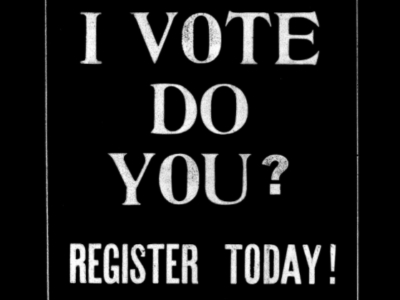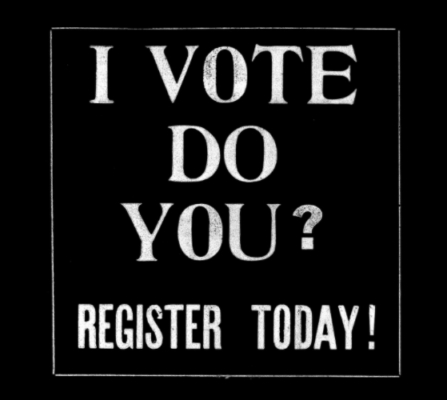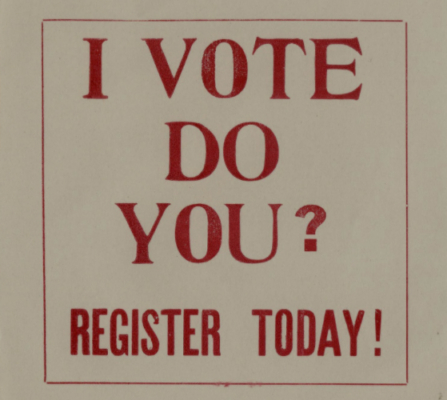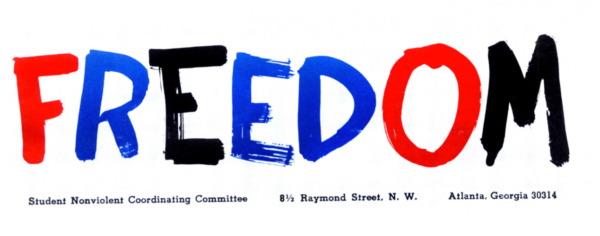
More Collaborations
Register
Laura Mullen, Nathan Davis, Ronaldo V. Wilson, & Terri Witek
(“should it have been written forward”)
by Laura Mullen
Created using materials from The Amistad Research Center, “Register” picks up (with awe) the mission of the Voter Education Project of 1962–63: “providing voters with the knowledge and the will to register.” Register, both noun and verb, evokes the necessary precondition of voting but speaks also to the urgent necessity of being heard and seen. To register (to notice, also to make an impression), to be registered (recorded), are both key here, but also invoked is, “The range of a voice or instrument; spec. the particular range of tones which can be produced in the same way and with the same quality.” It is Fannie Lou Hamer’s narrative (“I tried to register”) which starts the text and provides its title—and it is Hamer’s poignant and timely question, “Is this America?” which ends the work: the steady brilliance of Hamer (whose speeches are cited with the permission of her daughter, Jacqueline Hamer Flakes), at once heroic and human, shows the way forward as an eternal North star. In the early days of the Civil Rights movement, registration required extraordinary bravery and trust, as well as hope (as a record of interviews with prospective voters notes, “At the conclusion of one interview, a nervous respondent asked that her name be erased because of fear that her family would suffer because she had consented to the interview”). To recall and respect the courageous voices in the archive, to honor the heroism of those who spoke when speaking was an enormous risk, made collage the work’s necessary form: those who paved the way for rights we might now too easily take for granted must register—represent and speak for themselves. Lyric interventions are kept to a minimum: as John O’Neal puts it (in “Despite Everything” [July 1964]), “We need as much reality as we can get to prevent more tragedy,” and the text of the Voting Rights Act of 1965 is a touchstone, even as the included contemporary touches remind us that the Act, weakened by the Supreme Court in 2013, remains a threatened—and urgently necessary—guardian of freedom. Included in “Register” are citations from “literacy tests” from Alabama and Louisiana, those shameful documents used to disenfranchise citizens, for example: “In the space below, write the word ‘noise’ backwards and place a dot over what would be its second letter should it have been written forward.” In the effort to write it “forward” now, “Register” puts those painful and absurd tests into juxtaposition with other documents, some of which have been subjected to various forms of “Gerrymandering,” destabilizing representation. Because “Register” places exhortations and encouragements to vote in the context of encounters with the kinds of “procedures and devices” which have been used to suppress the vote, the audience may, at some points, find themselves struggling to rescue sense where it has been subjected to violent distortion—a necessary experience, a reminder that sense is not given, but emerges from shared struggle. In this work I have assembled (“in Congress”) various sources united by their focus on voting rights with John O’Neal’s words in mind:
Writing on political subjects is all too pedestrian-serious anyway. None of it, even the very best, is ever that true, or precise, yet it is always written like a manual for running a machine, or like a witness, or as if it came from God…Why not, instead, a dialogue, dream, stream of fancy, imaginary conversation, what you will—that can better reflect the truth in that it does not falsely pretend to an order and knowledge it does not have…
Why not, as O’Neal suggests, a text which exposes both its limitations and its complexity in order to invite participation in the production of a collective truth? This collage, montage, or mash up, voiced by Laura Mullen, Rodrigo Toscano, Ronaldo V. Wilson, and Terri Witek, and composed / transformed by Nathan Davis, samples voices, tones, traces, and codes from history and the present, to describe the struggle between efforts to register, and activity meant to suppress the vote. “Protest,” DeRay McKesson said, “is telling the truth in public.” So is art. “Register” is a response to the longing for a fair and just and public truth, in the context of our fraught history (in the real of its violence). This score, and the composition, is an encouragement to that other public truth-telling which is the full participation in the civic life of the land: the understanding and exercise of the right to vote. ****
Composer’s Note
by Nathan Davis
This sonic realization of “Register” incorporates two samples from Fannie Lou Hamer’s historic testimony before the DNC Credentials Committee in 1964, which may (and should!) be heard and read in its entirety here. Though heard directly only at the beginning and the end of “Register”, Hamer’s singular voice and legacy echo throughout the piece: the urgency and intonation of her oration drives its purpose, and her cadence undergirds its rhythms. In combining this historic recording together with the readings from Mullen, Toscano, Witek, and the song settings by Wilson, I have attempted present a multiplicity of voices raised in common cause with Hamer’s example and leadership.


